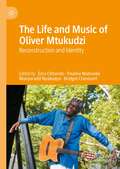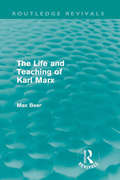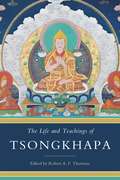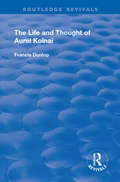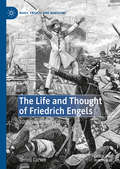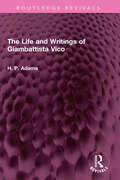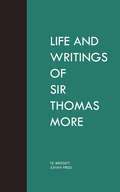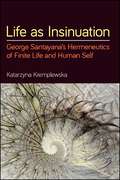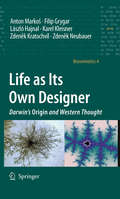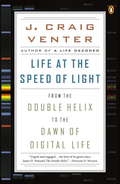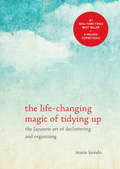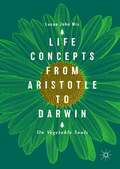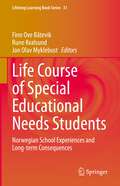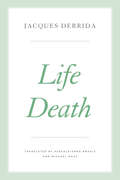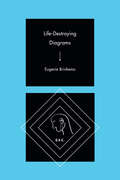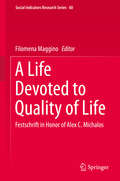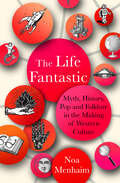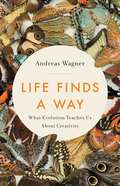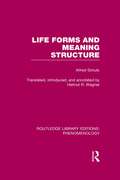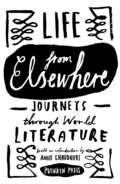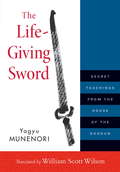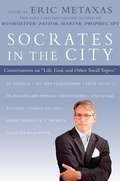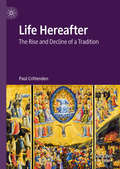- Table View
- List View
The Life and Music of Oliver Mtukudzi: Reconstruction and Identity
by Ezra Chitando Pauline Mateveke Munyaradzi Nyakudya Bridget ChinouririThis book is a critical reflection on the life and career of the late legendary Zimbabwean music icon, Oliver “Tuku” Mtukudzi, and his contribution towards the reconstruction of Zimbabwe, Africa and the globe at large. Mtukudzi was a musician, philosopher, and human rights activist who espoused the agenda of reconstruction in order to bring about a better world, proposing personal, cultural, political, religious and global reconstruction. With twenty original chapters, this vibrant volume examines various themes and dimensions of Mtukudzi’s distinguished life and career, notably, how his music has been a powerful vehicle for societal reconstruction and cultural rejuvenation, specifically speaking to issues of culture, human rights, governance, peacebuilding, religion and identity, humanism, gender and politics, among others. The contributors explore the art of performance in Mtukudzi’s music and acting career, and how this facilitated his reconstruction agenda, offering fresh and compelling perspectives into the role of performing artists and cultural workers such as Mtukudzi in presenting models for reconstructing the world.
The Life and Teaching of Karl Marx (Routledge Revivals)
by Max BeerFirst published in English in 1921, this work was originally written by renowned Marxist historian Max Beer to commemorate the centenary of Marx’s birth. It is a definitive biography, full of interesting personal details and a clear and comprehensive account of Marx’s economic and historical doctrines A special feature of this unique work is the new light thrown on Marx’s attitude to the "Dictatorship of the Proletariat" and Bolshevist methods generally.
The Life and Teachings of Tsongkhapa
by Robert A.F. ThurmanA must-read for students of Tibetan Buddhism, The Life and Teachings of Tsongkhapa provides a thorough exploration of the great teacher’s wisdom.In The Life and Teachings of Tsongkhapa, you’ll discover Tsongkhapa’s teachings on transcendental aspects of sutra, tantra, and insight meditation, mystic conversations with great bodhisattvas, deeply spiritual songs in praise of Manjushri and Maitreya, and much more. The anthology concludes with a number of intensely moving songs in praise of Tsongkhapa and his immeasurable contribution to Tibetan Buddhism by such realized and remarkable Tibetan Buddhists as the Seventh Dalai Lama, the Eighth Karmapa, Dulnagpa Palden, and Khedrup Je. This edition has been substantially corrected by Robert Thurman and contains a new introduction and a bibliography of all the works referenced in the text.
The Life and Thought of Aurel Kolnai
by Francis DunlopThis title was first published in 2002: ’I sincerely believe that Dr Kolnai is one of the most original and stimulating thinkers in the field of political philosophy alive today.’ Karl Popper Kolnai's moral and political thought was developed against the background of Liberal and then Bolshevist revolutions in Hungary, the gradual move towards fascism in twenties and thirties Vienna, and the progress of the Second World War as seen from the USA. Born a Jew, he became a Roman Catholic, and lived successively in Hungary, Austria, France, the USA, Canada and England. He remained, throughout his extraordinary life, a passionate believer in reason and common sense, and the sworn enemy of all philosophical and political systems. Study of Kolnai has been hampered by political developments, his own peripatetic life, and the fact that his writings appeared in five different languages, yet interest in Kolnai is now growing. This book offers the first comprehensive picture of Kolnai's complete works and life. Dunlop presents Kolnai the man in his social and political setting, and offers an accessible exploration of all his writings, whether published or not, including translated passages from papers and letters in Kolnai's various languages. Including a selective bibliography of Kolnai's works, this book presents an important study of this unique political and moral philosopher, showing his relevance in contemporary philosophical thought.
The Life and Thought of Friedrich Engels: 30th Anniversary Edition (Marx, Engels, and Marxisms)
by Terrell CarverWorldwide political changes since 1990 have driven a re-evaluation of Marxism, a renaissance in Marx-studies, and a renewed interest in his lifelong intellectual partner and personal friend Friedrich Engels. In Terrell Carver’s 30th anniversary edition of his pioneering biographical study of the ‘junior partner’ – which still remains the only one to balance Engels’s pre-Marx, with-Marx, and post-Marx writings, giving a rounded view of his life and thought – Carver adopts a comparative and critical approach, neither taking the ‘perfect partnership’ as a given, nor presuming that all the intellectual fireworks were Marx’s. Engels’s famously ‘bourgeois’ class position and ‘champagne socialist’ lifestyle emerge as resolutions rather than contradictions – they provided opportunities for activist writing and politicking that would not otherwise occur. This study is driven by questions that readers might like to ask about Engels, rather than by the sheer weight of archival materials and stereotypical framing. A newly written introduction provides reflections on how politics since the 1990s has brought Marx, Engels, and Marxisms back to life, and how publication of the Marx-Engels ‘collected works’ in a definitive edition, and in English translation, have promoted interpretive innovation. Engels himself did his best to establish his own biographical narrative. This book enables readers to assess that dominating view for themselves.
The Life and Writings of Giambattista Vico (Routledge Revivals)
by H. P. AdamsFirst published in 1935, The Life and Writings of Giambattista Vico is a succinct biography of the Italian philosopher, Giambattista Vico. Carefully documented, the book comments on Vico’s life as well as his oeuvre in a bid to extend his audience to the English-speaking population. From his early childhood to the influence of his writings after his death, the book provides a keen insight into the many facets of his philosophy. This book will be of interest to students of philosophy and history.
Life and Writings of Sir Thomas More: Lord Chancellor Of England And Martyr Under Henry Viii
by T. E. BridgettAfter this review of More’s public life and period of prosperity, the reader will be interested to know what was his interior life before God. In addition to what has been said of this by his biographers, especially Roper and Stapleton, as related in previous chapters, we have a picture of a holy statesman drawn by his own pen, in which he has unconsciously described himself; or rather we have an account given of a method of sanctification, which we know from other sources to have been the one so successfully adopted by himself.
Life as Insinuation: George Santayana's Hermeneutics of Finite Life and Human Self (SUNY series in American Philosophy and Cultural Thought)
by Katarzyna KremplewskaIn this book, Katarzyna Kremplewska offers a thorough analysis of Santayana's conception of human self, viewed as part of his larger philosophy of life. Santayana emerges as an author of a provocative philosophy of drama, in which human life is acted out. Kremplewska demonstrates how his thought addresses the dynamics of human self in this context and the possibility of sustaining self-integrity while coping with the limitations of finite life. Focusing on particular aspects of Santayana's thought such as his conception of the tragic aspect of existence, and the role of the doctrine of spirit in his philosophical anthropology and critique of culture, this book also sets Santayana's thought in substantial dialogue with other thinkers, such as Heidegger, Bergson, and Nietzsche. Like Santayana's philosophy, this book seeks to build passages between theoretical reflection and practical life with the possibility of a good life in view.
Life as Its Own Designer
by Zdenek Neubauer László Hajnal Zdenek Kratochvíl Filip Grygar Karel Kleisner Anton MarkošIt has been nearly 150 years since Darwin published On the Origin of Species, and his theory of natural selection still ignites a forest of heated debate between scientific fundamentalists on the one hand and religious fundamentalists on the other. But both sides actually agree more than they disagree, and what has long been needed is a third way to view evolution, one that focuses more on the aspect of life and "being alive", one that can guide us through, and perhaps out of, the fiery thicket. This book, a seminal work in the burgeoning field of Biosemiotics, provides that third way, by viewing living beings as genuine agents designing their communication pathways with, and in, the world. Already hailed as the best account of biological hermeneutics, Life As Its Own Designer: Darwin's Origin and Western Thought is a wholly unique book divided into two parts. The first part is philosophical and explores the roots of rationality and the hermeneutics of the natural world with the overriding goal of discovering how narrative can help us to explain life. It analyzes why novelty is so hard to comprehend in the framework of Western thinking and confronts head-on the chasm between evolutionism and traditional rationalistic worldviews. The second part is scientific. It focuses on the life of living beings, treating them as co-creators of their world in the process of evolution. It draws on insights gleaned from the global activity of the Gaian biosphere, considers likeness as demonstrated on homology studies, and probes the problem of evo-devo science from the angle of life itself. This book is both timely and vital. Past attempts at a third way to view evolution have failed because they were written either by scientists who lacked a philosophical grounding or New Age thinkers who lacked biological credibility. Markoš and his coworkers form an original group of thinkers supremely capable in both fields, and they have fashioned a book that is ideal for researchers and scholars from both the humanities and sciences who are interested in the history and philosophy of biology, biosemiotics, and the evolution of life.
Life at the Speed of Light
by J. Craig VenterThe renowned scientist and author of A Life Decoded examines the creation of life in the new field of synthetic genomics.
The Life-Changing Magic of Tidying Up: The Japanese Art of Decluttering and Organizing (The Life Changing Magic of Tidying Up)
by Marie KondoThis best-selling guide to decluttering your home from Japanese cleaning consultant Marie Kondo takes readers step-by-step through her revolutionary KonMari Method for simplifying, organizing, and storing. <P><P>Japanese organizational consultant Marie Kondo takes tidying to a whole new level, promising that if you properly declutter your home once, you'll never have to do it again. Whereas most methods advocate a room-by-room or little-by-little approach, the KonMari Method's category-by-category, all-at-once prescription leads to lasting results. In fact, none of Kondo's clients have been repeat customers (and she still has a three-month waiting list of new customers!). <P><P>With detailed guidance for every type of item in the household, this quirky little manual from Japan's newest lifestyle phenomenon will help readers clear their clutter and enjoy the unique magic of a tidy home--and the calm, motivated mindset it can inspire.
Life Concepts from Aristotle to Darwin: On Vegetable Souls
by Lucas John MixThis book traces the history of life-concepts, with a focus on the vegetable souls of Aristotle, investigating how they were interpreted and eventually replaced by evolutionary biology. Philosophers have long struggled with the relationship between physics, physiology, and psychology, asking questions of organization, purpose, and agency. For two millennia, the vegetable soul, nutrition, and reproduction were commonly used to understand basic life and connect it to “higher” animal and vegetable life. Cartesian dualism and mechanism destroyed this bridge and left biology without an organizing principle until Darwin. Modern biology parallels Aristotelian vegetable life-concepts, but remains incompatible with the animal, rational, subjective, and spiritual life-concepts that developed through the centuries. Recent discoveries call for a second look at Aristotle’s ideas – though not their medieval descendants. Life remains an active, chemical process whose cause, identity, and purpose is self-perpetuation.
Life Course of Special Educational Needs Students: Norwegian School Experiences and Long-term Consequences (Lifelong Learning Book Series #31)
by Finn Ove Båtevik Rune Kvalsund Jon Olav MyklebustThis book discusses the contested issue of how different kinds of special educational support in Norway, such as placement in special classes or use of teacher assistants, prepare Special Educational Need (SEN) students for further education and adult life. This is done by following former students categorized as having special educational needs for twenty years, from the start of the upper secondary school until their mid-thirties.Different choices and the adjustments and active adaptations young people make throughout their lives is a recurring theme, focusing on education, work, family, mental health, and social networks. The authors in this volume analyze and critically discuss topics around competence attainment in upper secondary school and higher education, employment, public support in adult life, mental health, social exclusion and isolation, and data-mediated networks. It concludes how the experiences from school time have affected the adaptation in later adulthood, and provides an answer to whether the assistive measures have benefits. What are the consequences in the short and long run? A central explanatory tension is between disabled students and disabling schools. We trace consequences – possibly non-intended – for the former SEN students due to the stigmatization effect of receiving special educational help in a vulnerable phase of life. The authors interpret results within a framework of life course approaches and disability theories. The perspectives introduced in the book are of interest for researchers and academics in the social sciences, such as sociology, special education, and social work.
Life Death (The Seminars of Jacques Derrida)
by Jacques DerridaOne of Jacques Derrida’s richest and most provocative works, Life Death challenges and deconstructs one of the most deeply rooted dichotomies of Western thought: life and death. Here Derrida rethinks the traditional philosophical understanding of the relationship between life and death, undertaking multidisciplinary analyses of a range of topics, including philosophy, linguistics, and the life sciences. In seeking to understand the relationship between life and death, he engages in close readings of Freudian psychoanalysis, the philosophy of Nietzsche and Heidegger, French geneticist François Jacob, and epistemologist Georges Canguilhem. Derrida gave his “Life Death” seminar over fourteen sessions between 1975 and 1976 at the École normale supérieure in Paris as part of the preparation for students studying for the agrégation, a notoriously competitive qualifying exam. The theme for the exam that year was “Life and Death,” but Derrida made a critical modification to the title by dropping the coordinating conjunction. The resulting title of Life Death poses a philosophical question about the close relationship between life and death. Derrida argues that death must be considered neither as the opposite of life nor as the truth or fulfillment of it, but rather as that which both limits life and makes it possible. Through these captivating sessions, Derrida thus not only questions traditional understandings of the relationship between life and death, but also ultimately develops a new way of thinking about what he calls “life death.”
Life Death (The Seminars of Jacques Derrida)
by Jacques DerridaOne of Jacques Derrida’s richest and most provocative works, Life Death challenges and deconstructs one of the most deeply rooted dichotomies of Western thought: life and death. Here Derrida rethinks the traditional philosophical understanding of the relationship between life and death, undertaking multidisciplinary analyses of a range of topics, including philosophy, linguistics, and the life sciences. In seeking to understand the relationship between life and death, he engages in close readings of Freudian psychoanalysis, the philosophy of Nietzsche and Heidegger, French geneticist François Jacob, and epistemologist Georges Canguilhem. Derrida gave his “Life Death” seminar over fourteen sessions between 1975 and 1976 at the École normale supérieure in Paris as part of the preparation for students studying for the agrégation, a notoriously competitive qualifying exam. The theme for the exam that year was “Life and Death,” but Derrida made a critical modification to the title by dropping the coordinating conjunction. The resulting title of Life Death poses a philosophical question about the close relationship between life and death. Derrida argues that death must be considered neither as the opposite of life nor as the truth or fulfillment of it, but rather as that which both limits life and makes it possible. Through these captivating sessions, Derrida thus not only questions traditional understandings of the relationship between life and death, but also ultimately develops a new way of thinking about what he calls “life death.”
Life-Destroying Diagrams
by Eugenie BrinkemaIn Life-Destroying Diagrams, Eugenie Brinkema brings the insights of her radical formalism to bear on supremely risky terrain: the ethical extremes of horror and love. Through close readings of works of film, literature, and philosophy, she explores how diagrams, grids, charts, lists, abecedaria, toroids, tempos, patterns, colors, negative space, lengths, increments, and thresholds attest to formal logics of torture and cruelty, violence and finitude, friendship and eros, debt and care. Beginning with a wholesale rethinking of the affect of horror, orienting it away from entrenched models of feeling toward impersonal schemes and structures, Brinkema moves outward to consider the relation between objects and affects, humiliation and metaphysics, genre and the general, bodily destruction and aesthetic generation, geometry and scenography, hatred and value, love and measurement, and, ultimately, the tensions, hazards, and speculative promise of formalism itself. Replete with etymological meditations, performative typography, and lyrical digressions, Life-Destroying Diagrams is at once a model of reading without guarantee and a series of generative experiments in the writing of aesthetic theory.
A Life Devoted to Quality of Life: Festschrift in Honor of Alex C. Michalos (Social Indicators Research Series #60)
by Filomena MagginoThis Festschrift is published in honor of Alex C. Michalos, a great scholar and inspiration to many upcoming and famous academics and practitioners. The Festschrift celebrates his lifelong, outstanding scientific and cultural contribution to Quality of Life Research. It contains contributions written by the most prestigious and renowned scholars in the field of social indicators research and quality of life studies. Taken together, the contributions from scholars around the world reflect Michalos' stance that even though there may be differences in individual scientific positions, the language in the field of quality of life has no limits and boundaries.
The Life Fantastic: Myth, History, Pop and Folklore in the Making of Western Culture
by Noa MenhaimExplore the sprawling network of culture to discover the incredible ways in which ideas connect to shape the world we see today.These mind-blowing essays dig down to the roots of stories, myths and literary genres, travelling from art to politics to history to folklore, and from high to popular culture and back again. Through an intricate web of sidenotes, embark on a voyage of discovery from the unluckiest book ever made to Viking horned helmets to the sex life of vampires …. or from mermaids frolicking in the margins to the ancient Amazons to the power of Amazon and on to Utopia and Atlantis … This is western culture as you&’ve never seen it before.
Life Finds a Way: What Evolution Teaches Us About Creativity
by Andreas WagnerHow the principles of biological innovation can help us overcome creative challenges in art, business, and scienceIn Life Finds a Way, biologist Andreas Wagner reveals the deep symmetry between innovation in biological evolution and human cultural creativity. Rarely is either a linear climb to perfection--instead, "progress" is typically marked by a sequence of peaks, plateaus, and pitfalls. For instance, in Picasso's forty-some iterations of Guernica, we see the same combination of small steps, incessant reshuffling, and large, almost reckless, leaps that characterize the way evolution transformed a dinosaur's grasping claw into a condor's soaring wing. By understanding these principles, we can also better realize our own creative potential to find new solutions to adversity.Ultimately, Life Finds a Way offers a new framework for the nature of creativity, enabling us to better adapt, grow, and change in art, business, or science--that is, in life.
Life Forms and Meaning Structure (Routledge Library Editions: Phenomenology)
by Alfred SchutzThis volume contains a translation of four early manuscripts by Alfred Schutz, unpublished at the time, written between 1924 and 1928. The publication of these four essays adds much to our knowledge and appreciation of the wide range of Schutz’s phenomenological and sociological interests. Originally published in 1987. The essays consist of: a challenging presentation of a phenomenology of cognition and a treatment of Bergson’s conceptions of images, duration, space time and memory; a discussion of the meanings connected with the grammatical forms of language in general; a consideration of the relation between meaning-contents and literary forms in poetry, literary prose narration and dramatic presentation; and an examination of resemblances and differences in the inner forms and characteristics of the major theatrical art forms.
Life from Elsewhere: Journeys Through World Literature
by Amit Chaudhuri VariousWriters in Translation, established in 2005 and supported by Bloomberg and Arts Council England, champions the best literature from around the world. To mark the programme's tenth anniversary, ten leading writers from around the world, many of whom have been supported in their work by English PEN, explore the themes of movement, freedom and narrative. Introduced by Amit Chaudhuri, the collection includes contributions from:Asmaa al Ghul - Palestine resident; originally from Bangladesh - Translated from the Arabic by Elisabeth JaquetteMahmoud Dowlatabadi - Iran - Translated from the Persian by Ahmad Karimi-HakkakAyelet Gundar-Goshen - Israel - Translated from the Israeli by Sondra SilverstonChan Koonchung - Born in Shanghai; raised in Hong KongHanna Krall - Poland - Translated from the Polish by Philip BoehmAndrey Kurkov - Russia - Translated from the Russian by Amanda Love DarraghAndrés Neuman - Born in Argentina; moved to Spain - Translated from the Spanish by Nick CaistorAlain Mabanckou - Born in Congo; raised in France; lives in America - Translated from the French by Helen StevensonElif Shafak - TurkeySamar Yazbek - Syria - Translated from the Arabic by Ruth Ahmedzai KempFrom the Trade Paperback edition.
The Life-Giving Sword: Secret Teachings from the House of the Shogun
by William Scott Wilson Yagyu MunenoriThe legendary seventeenth-century swordsman Yagyu Munenori was the sword instructor and military and political adviser to two shoguns--and a great rival to Miyamoto Musashi. Despite his martial ability and his political power, Munenori's life was spent immersed in Zen teachings. These teachings formed the framework for his deeply spiritual approach to sword fighting. Munenori saw in the practice of the sword a way to transform the student into a total human being. The Life-Giving Sword is Munenori's manifesto on his approach. His central themes are the "life-giving sword"--the idea of controlling one's opponent by spiritual readiness to fight rather than by actual fighting--and "No Sword," which is the idea that the mind must be free of everything, even the sword itself, in order to get to the place of complete mastery. Munenori's ideas are applicable not only to martial arts but to business and human relations as well.
Life, God, and Other Small Topics: Conversations from Socrates in the City
by Eric MetaxasThis book is for the seeker in all of us, the collector of wisdom, and the person who asks, "What if?" from the author of Seven Men: And the Secret of Their GreatnessThe Greek philosopher Socrates famously said that "the unexamined life is not worth living." Using this as a starting point, Eric Metaxas created a forum encouraging successful professionals to actively think about life's bigger questions. Thus, Socrates in the City was born.First presented to standing-room-only crowds in New York City and written by luminaries such as Dr. Francis Collins, Sir John Polkinghorne, and Os Guinness, these original essays grapple with extraordinary topics from "Making Sense out of Suffering" to "Belief in God in an Age of Science." No question is too big--in fact, the bigger, the better--because nowhere is it written that finding the answers to life's biggest questions shouldn't be exciting and even, perhaps, fun.
Life, God, and Other Small Topics
by Eric MetaxasThis book is for the seeker in all of us, the collector of wisdom, and the person who asks, "What if?" from the author of Seven Men: And the Secret of Their Greatness The Greek philosopher Socrates famously said that "the unexamined life is not worth living." Using this as a starting point, Eric Metaxas created a forum encouraging successful professionals to actively think about life's bigger questions. Thus, Socrates in the City was born. First presented to standing-room-only crowds in New York City and written by luminaries such as Dr. Francis Collins, Sir John Polkinghorne, and Os Guinness, these original essays grapple with extraordinary topics from "Making Sense out of Suffering" to "Belief in God in an Age of Science." No question is too big--in fact, the bigger, the better--because nowhere is it written that finding the answers to life's biggest questions shouldn't be exciting and even, perhaps, fun.
Life Hereafter: The Rise and Decline of a Tradition
by Paul CrittendenIn this book, Paul Crittenden offers a critical guide to the problematic origins of biblical teaching about the afterlife and the way in which it was subsequently developed by Church authorities and theologians—Origen, Augustine, and Thomas Aquinas in particular. In the post–Reformation era the focus falls on the challenges set by modern secularism. The tradition encompasses a body of interconnected themes: an apocalyptic war in which the Kingdom of God triumphs over Satan’s powers of darkness; salvation in Christ; the immortality of the soul; and finally the resurrection of the dead and the last judgment, ratifying an afterlife of eternal bliss for the morally good and punishment in hell for wrongdoers. The critique questions these beliefs on evidential, ethical, and philosophical grounds. The argument overall is that what lies beyond death is beyond knowledge. The one fundamental truth that can be distilled from the once compelling body of Christian eschatological belief—for believers and unbelievers alike—is the importance of living ethically.
